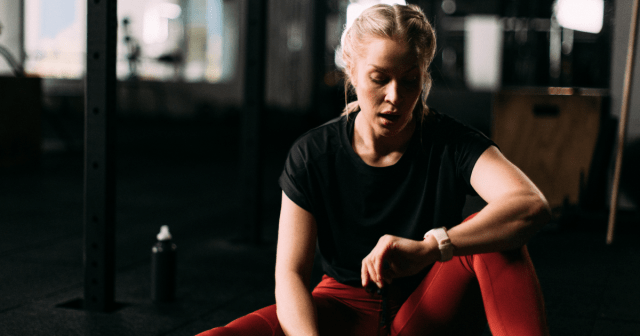That is the question. Do you really need fitness goals or would a more laidback, balanced approach to life and fitness make you happier?
We’ve all been there. An important workout you have scheduled in the evening suddenly becomes derailed by a request from a friend to meet up for dinner. Or maybe it’s that family obligation that you forgot to put on your calendar that forces you to skip your workout all together. And you start to feel your stress levels rising and the anxiety for missing a workout take over…
In the best case scenario, exercise reduces stress, not adds to it.
Stop! Stop right there. While exercise is ultimately a good thing and, naturally, important for our health and well-being, striving for our fitness goals shouldn’t override everything else and unduly cause more stress.
Yes, you have a fitness routine and a workout plan, but life happens – and we all just have to go with it and try our best to find a way to balance life and fitness.
Here’s how you can start figuring out ways to optimize your life and decrease your overall stress rather than adding to it. Instead of setting yourself strict fitness goals that may ultimately be impossible to reach and lead to more stress, maybe try this:
Focus on the progress your making and the joy of exercise.
Don’t Place Too Much Emphasis on Race Results
If you’re into endurance sports, like running or cycling, you may set goals according to a specific race you want to compete in. Unless you’re aiming to tackle an extreme distance, in which completing is a win in itself, you may have specific time goals that you train to reach.
That means placing tons of energy and effort during training on reaching this goal and failure to do so on race day can often lead to negative reactions and even disappointment. After all, training hard for an event often means sacrificing other aspects of your life such as family, friends, and sometimes even work, and not reaching these goals can make it seem like it was all for nothing.
In fact, a study done by researchers in the Journal of Personality and Social Psychology found that in Olympic competitions, bronze medal winners were often happier and more satisfied than silver medalists.
Here’s what one researcher had to say about the cause of the results:
“While bronze medalists can find contentment in thinking ‘at least I won a medal,’ silver medalists are often confronted with an imagined outcome that almost occurred — a preferred outcome in which they are the winner and have the gold medal hanging around their neck. Imagining what might have been can lead those who do better to feel worse than those they outperform.”
Even though most of us are not competing professionally, there is something to be learned:
Instead of focusing on what didn’t happen, it’s important to be happy with what you’ve achieved. In all likelihood, all that training you’ve done has made you fitter and healthier than you were prior to your race.
Chances are that even if you didn’t finish first, you probably still beat a lot of really fit, tough competitors, and you should be proud of that.
So, instead of falling into the depths of despair, keep in mind that in time results will come and decide before your event that you’ll be happy with your progress instead of focusing solely on the end result.
Have a Good Backup Plan
Even if your daily workouts are important to you and you’re able to fit them into your schedule most days, you’ll still need to be flexible and have a good backup plan.
Things are going to come up that derail your exercise plans each week. Instead of being stressed out about it, it’s important to realize that those other things like meeting up with your friends or spending time with your family are equally important to your happiness.
In this study on the role of friendships and happiness, researchers concluded that “Having friends and close peer experiences are both important predictors of life satisfaction, and satisfied individuals tend to have stronger and more intimate social relationships.”
While social relationships are important to individual happiness, that doesn’t mean you should give up on exercising to maintain them. The key is to find a balance between the two, and when something does come up, having a backup plan for your workouts.
This could be a quick strength training session before you go out, or even doing a short run during your lunch break when you won’t be able to run after work.
While this might mean that they’ll be days when a friend’s birthday party compromises that eight-mile run you had planned, formulating solid backup options when you need them is a good way to avoid skipping workouts and still do something to progress your fitness.
Whatever the situation, be willing to modify your training plan and be flexible. In the end, balancing life and exercise will make you a happier overall person.
Schedule Exercise Around Your Life – Not the Other Way Around
Even the most successful pro athletes (should) have an identity outside sports.
Unless you’re a pro athlete whose livelihood depends on winning competitions (and on second thought, even if you are), there should be more to life than just sports.
If and when you push all those other aspects of your life to the side and go all-in to achieve athletic pursuits, your healthy habits can turn into a negative.
Exercise addiction, a disorder in which people prioritize all aspects of their life around their exercise schedule, has shown to be extremely unhealthy, leading to disorders like insomnia, mood swings, social impairments, and other mental disorders.
Instead of building a training regimen that only considers your exercise goals, you’ll need to figure out your other life goals and make sure they have a place in your schedule as well.
Prioritize the things that bring you happiness and the time it will take to accomplish these things. That could mean:
- Spending quality time each week with a close friend or your partner
- Taking your child to an after school activity two or three times per week
- Taking a college course to learn a new language.
Making time for the things that are important to you (besides exercise) will lead to greater overall feelings of happiness and contentment within your life rather than just focusing on your fitness level.
When you do build your training plan, schedule your workouts around your life and not the other way around:
- See how much time you have left over in your day to exercise and schedule your workouts accordingly.
- Save long or difficult workouts for the weekends when you have more time, and keep your weekly workouts shorter and more efficient on weekdays when you’ll have more responsibilities that may take a higher priority.
Remember, you can always adjust your training schedule as needed. There may be days when you have more time than you expected, and you can take advantage of this too by extending workouts when you’re feeling good and have extra time.
Enjoy Exercise and Have Fun
Above all else, try to enjoy exercise and your life as much as possible.
If spending time with your friends and family is important to you, make sure to put it in your schedule.
Just make sure not to take things too seriously all the time, and have as much fun exercising as you can.
For those of us who find exercise rewarding and enjoyable, making the time for consistent workouts will be something you’ll need to do, too.
Try not to be driven only by results, and instead spend time reflecting on the process and the journey you’ve taken towards becoming a fitter and overall healthier person from the time since you started.
If you step away and take a look at the bigger picture, it’ll be easier to put things into perspective and see minor setbacks as part of life.
If you keep working and balancing your life as best you can, you’ll eventually reach those goals that you’re striving for. Just enjoy movement, have fun in the process and happiness (and health) will follow.
If you liked this post, don’t forget to share so that others can find it, too.
Or give it a thumbs up!
I like this article
Please note that the information provided in the Polar Blog articles cannot replace individual advice from health professionals. Please consult your physician before starting a new fitness program.





